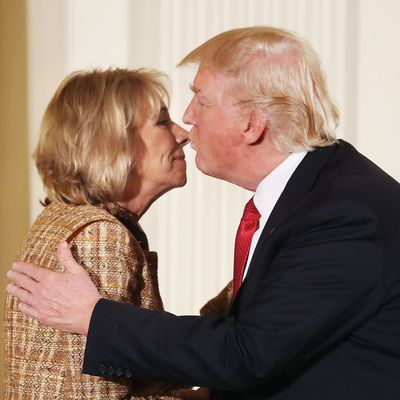
The version of Donald Trump who appeared yesterday in Missouri was a familiar figure from the campaign trail: a populist outsider, enemy of the Establishment, and traitor to his class. He pledged to get “rid of the loopholes and complexity that primarily benefit the wealthiest Americans and special interests” and to protect “ordinary Americans who don’t have an army of accountants.” At one point, he claimed in an aside, “I’m speaking against myself when I do this, I have to tell you.” The message, in other words, was almost the perfect inverse of the actual policy Trump was selling: a large regressive tax cut that has thrilled the party Establishment, the economic elite, and Washington lobbyists.
Trump has done many shocking things in office, but most of them follow directly, even explicitly, from the persona he put on full display during the campaign. Trump promised the country he would unleash law enforcement without restraint. He made clear his warm feelings toward Vladimir Putin – justifying his authoritarianism and even going so far as to literally ask him in public to hack his opponent’s email. He may not be building the wall and imposing tariffs, but he is at least trying. Even Trump’s, shall we say, free-form managerial style was well known.
His utter subservience to the party’s donor class breaks from the pattern. It is a complete reversal of his promise to “drain the swamp.” Decades ago, academics formulated a term that roughly corresponds to “the swamp.” It’s “regulatory capture,” which describes a process by which staffers in government make rules designed to benefit incumbent industries rather than the general public. Much of the work of government under Trump has consisted of turning over public policy directly to the Washington business lobby. Trump may like war heroes who weren’t captured, but he likes regulators who were.
Environmental Protection Agency director Scott Pruitt has secretly worked in concert with oil and gas lobbyists in the past, and in Washington has essentially bypassed the bureaucracy to turn the work of regulation directly over to fossil-fuel lobbyists. The landing team at the Department of Energy was headed by a lobbyist for Koch Industries.
Tom Price, head of the Department of Health and Human Services, is a doctor closely tied to the medical lobby. Price has received the most attention for his role as advocate of Obamacare repeal. Where he has achieved more influence is in a series of low-profile rulings with the consistent effect of ratcheting up Medicare payments for doctors. This week, he is advancing another rule to increase payment rates for medical equipment firms. Making the federal government spend more money enriching the medical industry is not a conservative principle at all. It is, however, a cause Trump’s administration has advanced rapidly. His Federal Communications Commission has handed a series of victories to cable and telecom firms, encouraging consolidation and discouraging competition.
Despite promising to break up the big banks during the campaign, Trump has abandoned his pledge and placed a Wall Street lawyer in charge of the Securities and Exchange Commission. He has given his two most important economic policy positions to Wall Streeters (Steve Mnuchin and Gary Cohn), and has made stock prices his favorite metric of economic success. The so-called “tax-reform” plan Republicans are formulating has been deeply shaped by the business lobby, which has formed a phalanx of support.
Some of the most astonishing regulatory capture is under way at the Department of Education. The appointment of Secretary of Education Betsy DeVos provoked frenzied opposition, on the basis of her lack of experience and ideological fascination with vouchers. But the focus on DeVos’s beliefs about primary education was always misplaced, for the simple reason that primary education is financed overwhelmingly at the state and local level, so DeVos could not ruin public schools even if she tried.
Where DeVos has had a massive impact is in higher education. The federal government has much higher leverage over post-secondary education due to its involvement with student loans. These loans have often subsidized for-profit colleges, which lure customers using federally backed student loans, and furnish them with substandard or useless education. The Obama administration began cracking down on the for-profit industry in a variety of ways: imposing standards and conditions for its loans, rather than spraying them out indiscriminately to whichever college could vacuum them up. DeVos has turned her department over to the for-profit college industry, which has used its power to protect its own rackets.
One ruling allowing lenders to recover more money from indebted students was issued by Taylor Hansen, a DeVos aide and former lobbyist for the for-profit industry. DeVos’s special assistant is Robert Eitel, the chief compliance officer at a for-profit institution facing multiple investigations for deceptive practices. She has selected A. Wayne Johnson, the CEO of a student-loan company, to run the department’s student loan program. The Department’s General Counsel, Carlos Muñiz, is a consultant who has worked for a for-profit institution that is also facing multiple state investigations for misconduct.
This week, she appointed Julian Schmoke, Jr. to run the Student Aid Enforcement Unit, which the Obama administration created to expose and halt fraud by colleges and universities. Schmoke comes directly from DeVry University, which last year had to pay $100 million over its misleading practices.
The spectacular and telegenic failures of the Trump administration are obscuring the highly effective policies under way. Trump has transformed the government into an apparatus for protecting and enriching incumbent wealth. His chaos and incompetence are tolerable to his party because Trump is fashioning an American oligarchy.






























